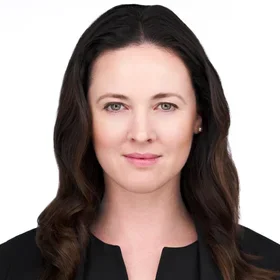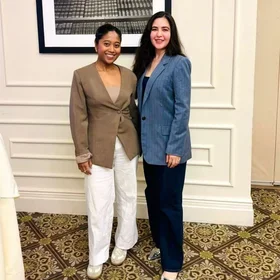Prior to completing Columbia’s full-time Strategic Communication program in 2020, Joseph Anthony knew he wanted to pursue a master’s degree but was unsure of which field. When he graduated from NYU, he was eager to find that sweet spot between corporate America and the arts. After taking a tour of the Columbia Morningside campus, speaking with alumni, and doing lots of online research, he decided that the M.S. in Strategic Communication program was a good match; he says he appreciated the way the people in the program think as well as how the University itself pushes boundaries and shifts paradigms. Now, an Associate Director of New Business at Omnicom Media Group, Anthony often reflects on his capstone project with gratitude because of its applicability to his work today.
Tell me more about the work you do at Omnicom Media Group.
As of January, I am the Associate Director of New Business at Omnicom Media Group. This role is a mix of people management, strategy, and pitch theater. I just completed my first full pitch process and I can see the direct transfer of knowledge from Capstone to this line of work. I have been answering requests for information and proposals, writing 26+ page responses, and preparing final presentations.
Have you always known you wanted to go into this field?
I always knew I wanted to get my master's degree. I received my undergraduate degree from NYU, in the Gallatin School of Individualized Study, where I devised my own concentration. I combined my own personal interests in marketing, business, and communications with performing and visual arts. My challenge was finding that intersection between corporate America and America's artistic cultural roots and fabric and figuring out how they come together. Because ultimately, everything is a money maker or should be monetized. So, how do you make money through performing and visual arts? How do you market them? How do you tap into people’s psyche and make them believe they need it?
I felt like a ‘jack of all trades and a master at none’ when I came out of undergrad. I knew I had to perfect and strengthen my hard skills. I worked in multiple different aspects of marketing and communications, influencer marketing, visual merchandising, and wholesale marketing. I did consumer-facing roles and eventually got to a point where I was not in love with sales. I then decided it was time for my master’s and I wanted to find that opportunity where it was a good mix of both metrically-driven objective insight with a more subjective, creative balance. I felt the Columbia University experience provided a good core foundation in the basics and gave me the balance of business and creative opportunities, all while building up my hard skills. But it also provided the autonomy and the opportunity to explore personal interests in other schools with electives.
Which courses at Columbia do you especially appreciate?
Any course with Dr. Kevin Visconti was a pleasure; he pushed me past my comfort zone. I took the Compelling Communicator course and the Authentic Leader course with him. In both classes, he helped me learn to navigate uncomfortable conversations and communicate clearly, efficiently, and concisely.
How was your experience completing the full-time path while working?
Time management is the key to success! I think as a U.S. citizen I had the privilege of finding work without needing a visa, and so it was my job to understand and define my bandwidth. Schoolwork supplemented by real-life experiences is invaluable and only helped me better understand the courses and how I could transfer this knowledge to the real world.
How have you applied what you learned during your master’s to your current role, as well as previous projects?
The biggest takeaway for me from the program has been the capstone project. During this project, we put together a pitch from start to finish with written responses, sometimes 26 pages long. We had subsections with metrics, hard quantitative facts, details speaking to the qualitative consumer, as well as the brand you are trying to promote to these consumers. And in my current role, I work a lot with the process of crafting and creating a layout of deliverables to win new business and when doing that for the first time at Omnicom Media Group, I immediately saw the connection between the tasks of capstone. It felt like I came full circle and it really did validate the 18 months of work that I put in at Columbia.
What is your advice for future students?
I truly believe that the Columbia diploma opens doors and avenues that give you credibility and allow you to explore other avenues. So get uncomfortable and use the tools and resources provided to you to learn how to navigate. Show up open and willing to learn and be a sponge. You’re in your master's, a choice to participate in higher education, so embrace the time and safety of your environment to fail forward and use resources to grow as an individual and professional.


